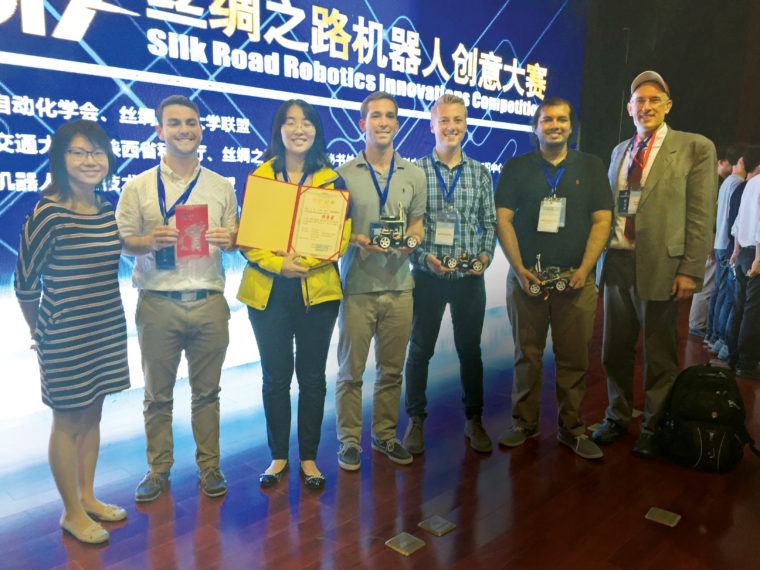Early this summer, five students from WashU’s School of Engineering & Applied Science set out to put their technical chops to the test in China. Led by Xuan “Silvia” Zhang, assistant professor in the Department of Electrical & Systems Engineering and the Department of Computer Science & Engineering, the team of five students traveled to Xi’an Jiatong University in the city of Xi’an, Shaanxi Province, to compete in the annual Silk Road Robotics competition. The competition is a whirlwind event showcasing innovative builds from engineers all across the world. The WashU team, comprising Adith Jagadish, Matthew Kollada, Meizhi Wang, William Luer and Andrew O’Sullivan, represented both school and country as the only team from the United States.
With more than 200 teams participating in the first round, the WashU team faced stiff competition right out of the gate. They presented PiCar — a scaled-down model of a self-driving car that used a small, single-board computer, known as a Raspberry Pi computer, to automate its driving functions — to a packed auditorium.
To get their driverless car moving, the team had to effectively combine electrical, mechanical and systems engineering with 3D printing and software, which they wrote themselves. Building PiCar was exacting. The crew had to fit as much work as they could into the few weeks leading up to the competition, spending time in the lab all the way up to the day of their departure and even sneaking in a bug-fix or two on their 15-hour flight to China.
“It was definitely the most hands-on engineering that I had ever done,” says Matthew Kollada, BS ’17. “I learned about as much in the competition as I had learned in a number of other classes.”
Their hard work secured them a spot among the final 16 teams. Though they didn’t win, the students were ranked in the second tier in the final stage, awarded a trophy as “Outstanding Winners” and received a cash prize of 5,000 Yuan.
For the students, being recognized at the competition was, of course, ideal, but they also saw that their PiCar could make a wider contribution to science.
“Our overarching goal for this project was to help university students and professors create algorithms for self-driving cars in the lab,” says Adith Jagadish, a first-year mechanical engineering graduate student from India. So, despite the growing commercial demand for advanced robotics technology, the students posted their designs online for free and made their software code — the mind of their autonomous machine — open source.
The competition was also a platform for them to relish the experience of creating something with their own hands.
“It almost seems as if we gave life to an inanimate object,” Jagadish says.
But the trip to China was not all joules without joy. After the competition, the team toured some of China’s big cities. Meizhi Wang, a senior in electrical engineering from China, was the bridge between their cultures.
“I am very proud of my country, and it was great to show the team around and surprise them with things about China that they did not know,” Wang says.
Under Meizhi and Professor Zhang’s able stewardship, the WashU robotics team sampled some of the cuisine in Xi’an and saw some notable sites, such as the famous Terracotta Army statues, the Great Wall and the Forbidden Palace.
“It was an incredible opportunity, and I had the time of my life there,” says Andrew O’Sullivan, a junior in mechanical engineering.
The Silk Road Robotics competition welded novel engineering, healthy competition and cross-cultural fun into a fulfilling experience for the WashU students who took part. The implications of technology like the PiCar have inundated conversations in academic and industrial circles alike with speculation on what the future of robotics will be, but, as Wang put it, for the PiCar team, it was just “good to be part of developing technology for the future.”



Comments and respectful dialogue are encouraged, but content will be moderated. Please, no personal attacks, obscenity or profanity, selling of commercial products, or endorsements of political candidates or positions. We reserve the right to remove any inappropriate comments. We also cannot address individual medical concerns or provide medical advice in this forum.